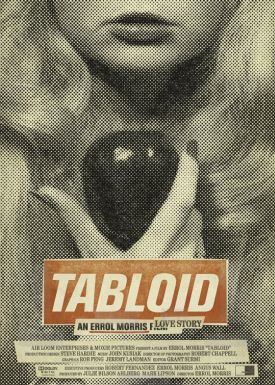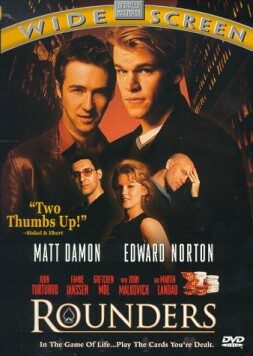Tabloid
Those who are unschooled in the ways of our cultural élites may find it somewhat strange that Errol Morris (The Thin Blue Line, Mr Death, The Fog of War) has titled his new documentary, Tabloid. I hope you will not think it presumptuous of me if I undertake to explain what I take to be his thinking in doing so. The movie tells the story of one Joyce McKinney, a former beauty queen from North Carolina who was also blessed with spirit and determination but, alas, not very good judgment. She briefly became a tabloid sensation in Britain back in the 1970s — I was living there at the time and remember it well — on account of having (allegedly) kidnaped her Mormon lover, Kirk Anderson, who had left her back in the U.S. when he went to do his missionary service in the U.K. According to the tabloids once she had abducted Kirk with the help of one or more hired goons, she whisked him off to an isolated cottage in Devon where she kept him as a “sex slave” who was “spread-eagled” and “chained” to the bed until he somehow managed to escape and alert the authorities.
It was, as one of Mr Morris’s interviewees put it, “the perfect tabloid story,” and this is borne out by the probability that “sex slave” and “spread-eagled” and “chained” were all most likely journalistic inventions. Likewise the pleasingly alliterative “Manacled Mormon,” as Mr Anderson was known to the British papers during his brief period of notoriety. Miss McKinney, not surprisingly, says to Mr Morris’s camera that the whole thing was pretty much a tabloid invention and that it is not possible for a woman to rape a man. Employing a now-venerable witticism, she says that it would be like putting a marshmallow in a parking meter. According to Mr Morris’s lengthy interviews with her and others, there seems to be some doubt as to whether there was even any penetrative coitus between them.
Among the others interviewed for the movie are two of the tabloid journalists who were most involved in the Manacled Mormon story at the time, Peter Tory of The Daily Express and Kent Gavin of the Daily Mirror, to explain their roles in it and that of their papers. Mr Tory and the Express were involved with Miss McKinney herself, paid her money for exclusive rights to her story and did a great deal to protect her from the law, curiosity seekers and, of course, other tabloids, while Mr Gavin and the Mirror instead cultivated a relationship with a former boyfriend who provided them with photos and other evidence suggesting that Miss McKinney had at one point earned her living as a nude model and prostitute, though perhaps one whose sexual services were unusually limited. Naturally, all that made the perfection of the tabloid story even perfecter.
But neither these two gentlemen nor any of the others that Mr Morris managed to interview are half as interesting as Ms McKinney herself who, in presenting her side of the story, is much less interested in her treatment by the British media of the 1970s than Mr Morris is — or, I might add, than most people would be after so many years have passed. As a result, he himself sometimes seems to be assuming the role of the sensationalizing tabloids, although he would doubtless argue that he has taken more pains than they ever did to get the story right. He is thus able to justify the expenditure of so much time and energy on a trashy bit of 30-year-old gossip on the grounds that it is somehow a critique of the others who have told the story rather than a competing narrative to theirs. People like him need to dip themselves in the prophylactic waters of ironic distance in this way in order to justify to themselves their slumming with us intellectually challenged proles who read stories like Miss McKinney’s merely because we are interested in them.
What brought this extraordinary woman to the attention of Mr Morris was the completely unrelated story of her seeking out a Korean geneticist named Jin Han Hong to have her deceased pit-bull Booger cloned. Though she used a different first name, she was soon identified as the same Miss McKinney who had figured in the British tabloid scandal all those years ago. Mr Morris saw an opportunity to replay it with the dog-cloning as a satisfying coda, even a way of cementing Joyce McKinney’s place in folk history. Joyce herself, who appears admirably uninterested in the kind of celebrity Mr Morris has to offer her, tells his camera that “I didn’t see any connection between cloning dogs and a 30 year old sex-in-chains story.” But the kind of people who watch movie documentaries will readily see it. It’s that tabloid touch which allows them to enjoy her account of her life while feeling superior to her.
And not just to her either. For it is a part of Mr Morris’s technique to use a simulated home movie screen to show snatches of contemporary films, commercials, cartoons and what appear to be actual home movies as if through a porthole in the middle of the big screen. He does this, I would say, in order to make Joyce McKinney stand for a whole vanished world — that of what Philip Larkin called “those old-type natural fouled-up guys” like Larkin himself who had not the benefit of the easy moral certainties of the post-1970s generation. In other words, this picture belongs to the genre, as someone once said of “Mad Men,” of “now we know better” — at least if you assume that the “we” includes all those not a part of that tabloid, trailer-park, redneck world where people are still allowed to be fouled up. I don’t know if Ms McKinney’s IQ is, as she proclaims it to be 168, but she is at least smart enough to have figured out that, however genuine she may seem before Mr Morris’s camera, he is making fun of her for the benefit of those who, like himself, will look down on her. Accordingly, she has taken to protesting against him and his film at festival screenings. Not that it will do her any good, but more power to her.
Discover more from James Bowman
Subscribe to get the latest posts to your email.








